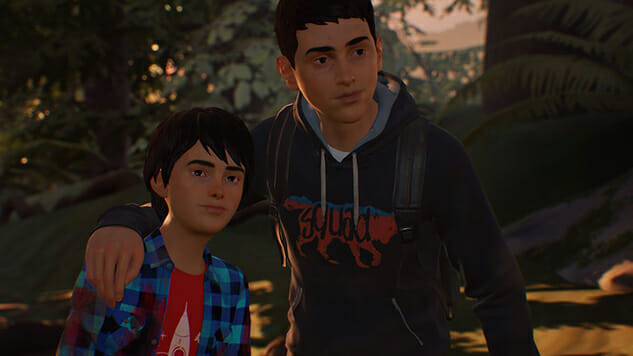What Other Games Can Learn From the Racism in Life is Strange 2

We’ve all seen them: viral Twitter videos of bigots saying and doing Very Racist Shit to Latinx people. They seem like caricatures of a past generation, but really, the sentiments these people espouse never really went away; they’ve simply been unveiled and amplified since the 2016 presidential election. It’s why, when a bigot in Life is Strange 2 told the protagonist—Sean Diaz, a Latino-American—that “thugs” like him are why “we need to build that wall,” it didn’t seem as unrealistic to me as it does to some non-Latinx people. It reflects how some people actually speak and think. Life is Strange 2 excels at showing how racism manifests in different ways—and how the unabashed bigot isn’t racism’s only form, making for one of the most nuanced takes on the subject in videogames.
The first episode of Life is Strange 2 doesn’t wait for one of its characters to openly state that “everything is political” for it to be clear on its philosophy and themes. Among the first things you do in the episode’s opening moments is walk into the Diaz family’s home and find an angry note from a neighbor telling Sean’s father, “I know my rights as a US citizen, maybe you don’t, and I expect you to also follow the rules.” Shortly after, their next door neighbor begins to harass Daniel, Sean’s little brother. When Sean steps in, his neighbor starts a fight and tells him to “go back to your country.”. The police are called, and, like so many publicly documented incidents of police brutality around the nation, Sean and Daniel helplessly watch as a white cop fatally shoots their father. It’s a deliberate sequence of events that connects racism to bigotry and violence, especially from those in power.
But Life is Strange 2 also knows better than to frame racism as only existing in its most extreme forms. It doesn’t fall into the trap of portraying racists as merely nonsensical or illogical or so over the top that it’s hard for the average person to see themselves in the depiction. The game knows better, and wants more introspection from its audience. It seems to understand you can say, do and believe racist things without being a radical racist in a viral Twitter video, and those microaggressions should require your reflection just as much as if you were (after all, as a nation, we’ve gotten to where we are because of both macro and microaggressions).
The most poignant part of the game is when Sean and Daniel arrive at a gas station. Like airports, gas stations bring people from different walks of life to one place. A white nuclear family sits outside, eating at a picnic table. At that point, the game prompts you to approach them and beg for food, so I hover, wondering if I should talk to them, or just avoid the situation and wait until I can buy something in the store. Ultimately, worried about Daniel’s hunger, I decide to go up to them, and strike up an awkward conversation. “Jesus, get a job, kid! I thought we left Berkeley to get away from this,” the husband shouted. I wondered if his hostility was due to Sean’s begging, or him being brown, or both, and took my leave.

Once Sean and Daniel walk into the gas station, they chat with the store clerk. She’s a frail elderly white woman named Doris who seems intensely concerned about who they are and what they’re doing—out of concern, according to her. Nonetheless, she gives Daniel a keychain for free and has a pleasant chat with them about a family photo on the wall.
“Trick or treat!” Daniel tells her as Sean looks through the items in the store.
“What are you supposed to be? Besides dirty?” she retorts.
I froze and heard myself audibly gasp at her response. I shouldn’t have been surprised, but I was because, in her momentary display of kindness towards Daniel, I had let my guard down. I thought back to whether I had Sean and Daniel wash up in the bathroom before going into the gas station, and remember that yes, they did, I didn’t mishear the line of dialogue. While one might be able to argue that the boys are still dirty from being on the road for days, or at least enough for her to comment on it, the implication is there: Daniel is dirty because he doesn’t “look” clean, because he’s brown, because, in her own words, he looks like a “mud boy”. Sean and Daniel don’t “look like [they’re] from around here.” It bothers her so much, she would rather be snide to an innocent child than share their excitement for Halloween.
 Keep scrolling for more great stories.
Keep scrolling for more great stories.

